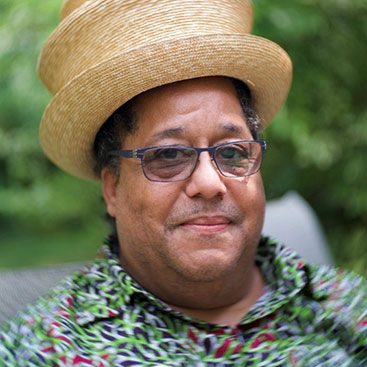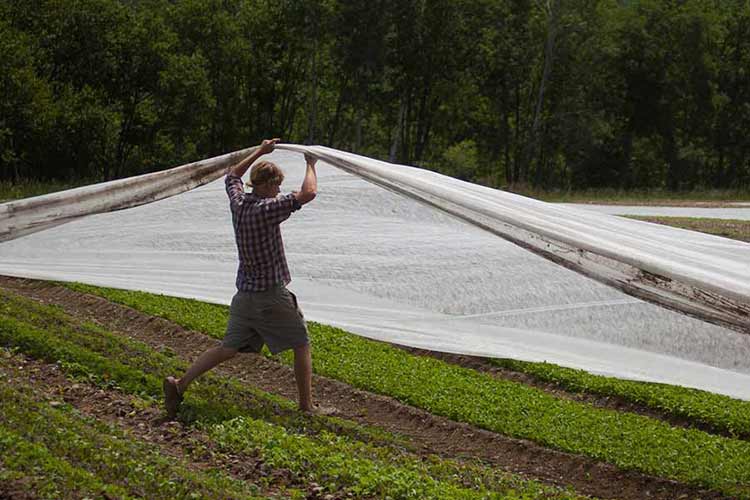 Faculty Spotlight: As a researcher and a professor, Dr. Scott Alves Barton is interested in a critical perspective of food systems and the way we make choices within them.
Faculty Spotlight: As a researcher and a professor, Dr. Scott Alves Barton is interested in a critical perspective of food systems and the way we make choices within them.

Dr. Scott Alves Barton describes himself as anomalous, a rare breed. He spent 30 years as a professional chef before entering academia, with tenures at historic restaurants like The Odeon, Tom Cat Bakery, Metro, and Aqua. He trained in Spain and France, worked under famous restaurateurs like Patrick Clark and Drew Nieroprant, and for a stint in the 90s was the personal chef to billionaire Reginald Lewis. After earning his PhD in Food Studies at NYU, he held adjunct positions around New York City before securing a fellowship at Notre Dame, where he is now a professor in the university’s Initiative on Race and Resilience.
But he was a cook long before he ever worked in a restaurant. Growing up in New York City, he learned his way around a kitchen from his mother, who drew on her skills as a dietician and her own culinary dreams. “My mom had wanted to be a chef,” he recalled. “She couldn’t, as a Black woman, but she raised us to learn to cook as two young boys, so that we would be independent and self-sufficient. So we were exposed at a very young age to a high level of culinary knowledge.”
These are just a sampling of the experiences Barton brings to the Culinary Institute of America’s prestigious master’s in Sustainable Food Systems program, where he teaches two classes (and whose curriculum he helped design): Race, Class, and Justice from the Field to the Table, and Food Movement Voices: How to Create Change.
Thinking Critically about Cuisine
CIA doesn’t just train students to work in the restaurant industry. It trains them to transform it, ushering in bold new approaches in their local communities and on a global scale. As tomorrow’s leaders, they’ll need an intersectional understanding of the entire world reflected in a single dish: the workers who harvested its ingredients, the systems that transported them across diverse and fragile ecosystems, the web of policies determining who prepares a meal and how fairly they’re treated.
Barton’s courses are designed to reshape the way students think about food, training them to approach the challenges ahead with empathy and rigor. In his teaching as in his research, he’s deeply interested in the way identity informs culinary practice. “The politics of identity—whether race, sexual orientation, or gender—is very important to me and to the future of this industry,” he explained. “I was raised by a woman who had a dream she not only deferred, but couldn’t realize. It made me very conscious of women. All of my work in my research, and a lot of my cooking, is about women’s work and women’s knowledge, and the fact that it is very sophisticated—and often ignored or maligned.”
He’s particularly interested in the way this knowledge is transmitted intergenerationally: among home or religious cooks in Brazil, for instance, or sharecroppers who moved to Milwaukee during the Great Migration. As a professor, he tries to help his students become more critical thinkers about the way knowledge is communicated, especially in modern media paradigms.
“We are in a very highly visual society, and most people I deal with as students have only grown up on screens, and only grown up with a hyper visual access to the world,” he said. “So in almost everything I do, I try to use visual material or have them look at where visual material is being used.”
This approach is more than just a way of engaging students in a familiar medium; it’s a way of helping them harness that medium for good. In Barton’s classes, students interrogate the relationship between global food systems and the environment, looking closely at how that relationship is refracted across social, cultural, and economic axes. They discuss concrete strategies, grounded in history, that they can take to create more sustainable agricultural practices, combat world hunger, and spread the fruits of our food systems more equitably.
In other words, students gain a broad theoretical understanding of the issues they’ll be called to address as food industry leaders: not just where change is needed, but where it’s needed most. At the same time, they hone practical leadership skills: how to be effective thinkers and communicators; how to market complex ideas in contemporary media ecosystems; how to collaborate on complex issues; and how to create intersectional solutions to intersectional problems.
Perhaps most importantly, they learn how to do these things in a manner guided by empathy for underserved populations, a layered understanding of systemic inequality, and an eye toward environmental justice. “Understanding what it’s like to be othered and excluded is something I know in my bones,” Barton said. “Getting people to understand how to be critical listeners and thinkers is germane to my pedagogy in everything I do.”
“No One Just Makes Food”
In Barton’s view, the CIA’s master’s in Sustainable Food Systems offers a rounded perspective of the food and beverage industry, with a combination of asynchronous remote learning and in-person residencies ideal for those considering a career transition. “If you’re trying to make a change, you can get your feet wet and still have your income,” he said.
As he pointed out, the program focuses on the task of driving reform, ensuring that students leave with the leadership skills essential to creating change and achieving impact from the local to the global level. Crucially, it complements these skills with a critical understanding of the systems that create and sell food, systems that are themselves the product of human choices. What students ultimately learn, as Barton put it, is that “No one just makes food.”
“Whether you’re growing stuff to sell at markets or to wholesalers, or you’re running a restaurant or a hotdog stand, it’s a reflection of who you are, the choices you’re making, the way you’ve been acculturated in general and specifically around food,” he explained. “It’s all about choice-making that really is already political in its nature. There is a core part of this program that asks you to be upfront and personal about being political in your choice-making.”
CIA prepares students for the hard work of transforming food systems, and on a deeper level it gives them “a toolkit to make better choices” as they do so, he said. “Depending on where you’re choosing to apply yourself, you come out of the starting gate with a good set of skills—knowledge, critical thinking and theorization—that you can apply in your niche within the system or the culture of food.”
Finding Your Voice in Sustainable Food Systems
Asked what advice he’d offer prospective master’s in Sustainable Food Systems students, Barton recommended they think carefully about who they are and what they want out of the program. While everyone has their own gifts, it takes time and reflection to find the best use for them. “You need to figure out what your voice in food is,” he said. “As a cook, you could be in a test kitchen, you could be a writer, a dietician, stylists for film, et cetera. So you need to take a hard look at that.”
In a similar vein, he encouraged prospective students to think carefully about their place in the broader food system: to conduct “a critical analysis of who you are in the field,” as he put it. “What do you need to serve? What do you need to address that you can actually make a difference in?”
Once you’ve contemplated your own goals, Barton suggests reaching out to someone in the field you’re interested in. “I always advocate professional interviewing,” he concluded. “I’ve done that my whole life. When I wanted to do something, I would find somebody who’s a professional in that area, and I asked them if I could interview them to understand what it looked like. Now, their experience is not gonna be mine, but I get a little taste of what it looks like on the inside.”

